Wisconsin’s Swiss voice goes off the air
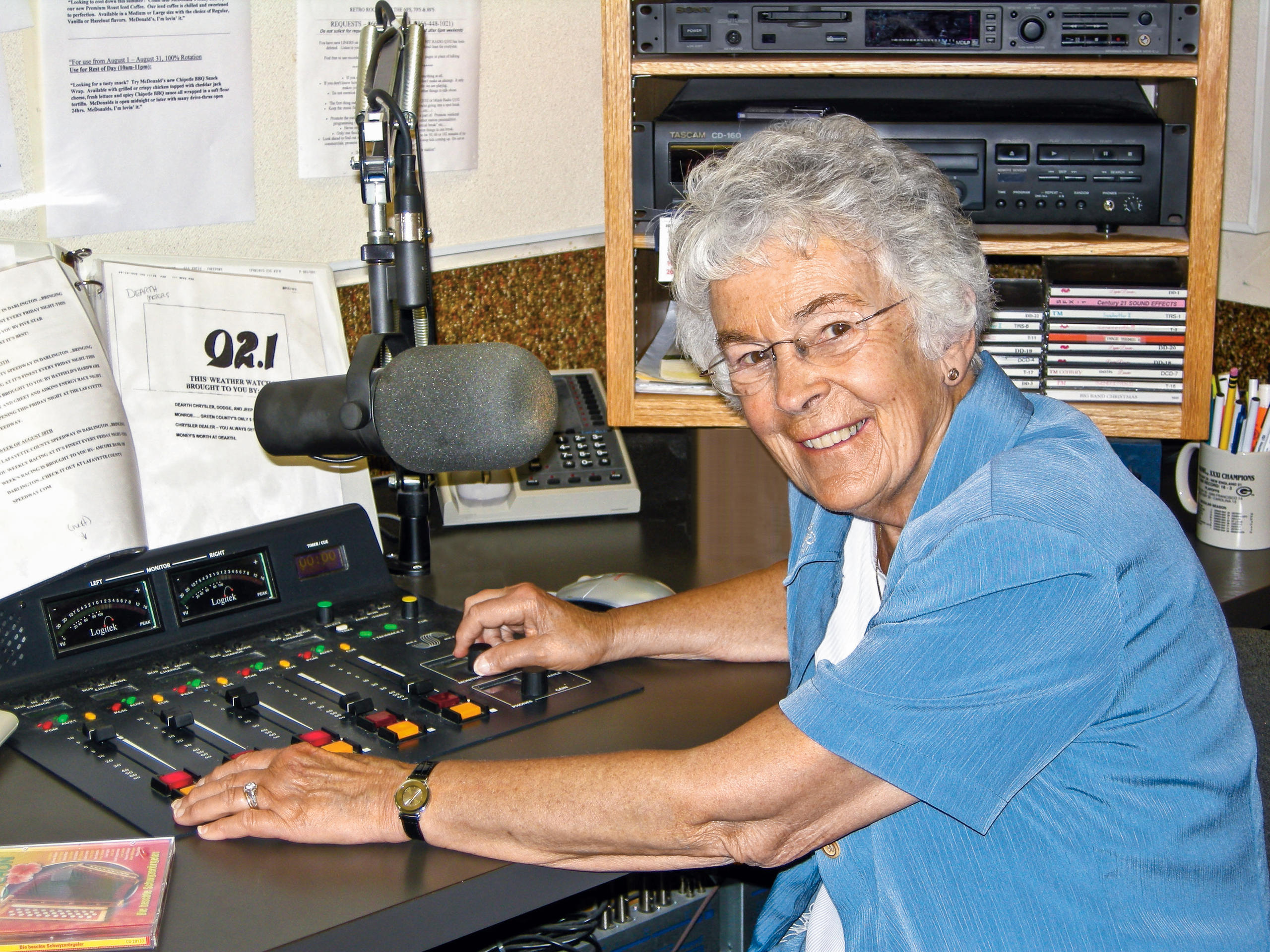
Martha Bernet just broadcast her last radio show of Swiss folk music after having hosted it for six decades in Monroe, Wisconsin, the Swiss cheese capital of the United States.
This portrait of Bernet from the book “Westward – Encounters with Swiss American Women”, originally published in 2010, looks back on her remarkable career and journey from Switzerland to the United States.
She deftly adjusts the controls of the studio soundboard: “Good afternoon, it’s time for our Swiss folklore program on station WEKZ. I hope you find time to listen.” Radio broadcasting has been a part of Martha Bernet’s life for fifty years. Last year, her coworkers at the station gave her a trip to Switzerland. “You are our calling card!” they said.
Martha Bernet’s last programme on WEKZ radio was broadcast on May 11. It was also Bernet’s 60th anniversary doing the six-day-a-week show of Swiss folk music.
The Book, Westward: Encounters with Swiss American Women, was written by Susann Bosshard-Kälin and includes historical texts by immigration expert Leo Schelbert and photos by Annina Bosshard.
On the homepage of the local station, WEKZ, Monroe, Wisconsin, she is called “everybody’s Swiss sweetheart.” Martha is one of the gang among the mostly young studio crew. And no one would guess her 81 years as she bounds up the studio steps. “Our program is the last Swiss radio program in the whole country. I’m on the air six days a week from 1 to 1:30 p.m.”
She began with 78 records in the 1950s when her predecessor, who was in a serious traffic accident and suffered a heart attack, asked her to fill in. “I never thought I would enjoy it as much as I have.” And after the 45 and 33 records, it is now her own CDs that she plays for homesick Swiss six days a week.
“I always record two weeks in advance. I announce each piece in Swiss-German and then translate, although terms like ‘Mischtchratzerli’ prove somewhat difficult. At the close of each broadcast I sign off in Swiss-German ‘Sisch wider alls für hüt. Ich hoffä, z’Programm heig Euch gfallä. Uf Widerlose, morn zur gliiche Zyt. That’s all for today. I hope you enjoyed the program. Goodbye until tomorrow at the same time.’” Martha Bernet’s broadcast area reaches far beyond Monroe. “I receive messages from Texas, Chicago and even Seattle from people who hear my folk music on their PCs. Oh, how I’d miss radio if I couldn’t do it anymore.’”
Martha Bernet invites me for coffee and cake in her “Swiss chalet” in Monroe.
Permanent red geraniums decorate the windows, and near the entrance stands a tall spruce tree she received decades before, smuggled in as a present from Switzerland. Her brother had sneaked it into the United States, she explains in her broad Bernese accent. She has lost none of her mother tongue.
“I have been over there 35 times. I say over there when I mean going to Switzerland. It’s a wonder that after 60 years, I’m still at home in both places.” She explains proudly how every day before breakfast she logs on to the meielisalp.com webcam. “That way I know how the weather is there. The Blick, the Berner Zeitung, and the Oberländer are my daily online news.”
Actually, Martha resisted using a computer for a long time. “Ten years ago at dinner with my children, I made a remark that I was becoming dumber by the day; that I was not exercising my brain enough. And before I knew it, there was a computer in the house along with lessons from my oldest son. And today, what would I do without e-mail and the World Wide Web?”
Childhood in Leissigen
An aerial photo of Lake Thun hangs on the wall behind the corner table in the kitchen. “Because the photo didn’t fit in my suitcase, my nephew cut off Interlaken. The important thing is that Leissigen is there.” Wherever one looks, Martha’s house is rich with Bernese decorated pottery, Albert Anker paintings, and carved furniture and cows.
“I will not fly to Switzerland any more. As I walked down the path past my family home one last time, and when finally the lake disappeared from my view, there was certainly a pang in my heart. But I said to myself, ‘Martha, you have always been able to persevere. You can do this, too.’ You know, I am also an American. My former school friends in Switzerland have all moved away; the old people in the village have passed away.”
Martha returns to her life story. “I was born in Leissigen on Lake Thun on April 16, 1927. I grew up with two sisters and two brothers. I was the youngest and the spoiled one. My oldest brother was 18 when I was born. It was as if we had two families. My mother always said‚ ‘Thank God we had you three later; that’s how I stayed young.’” Father Ruedi was a mechanical technician and the village civil registrar and notary; mother Frieda, a lady’s dressmaker.
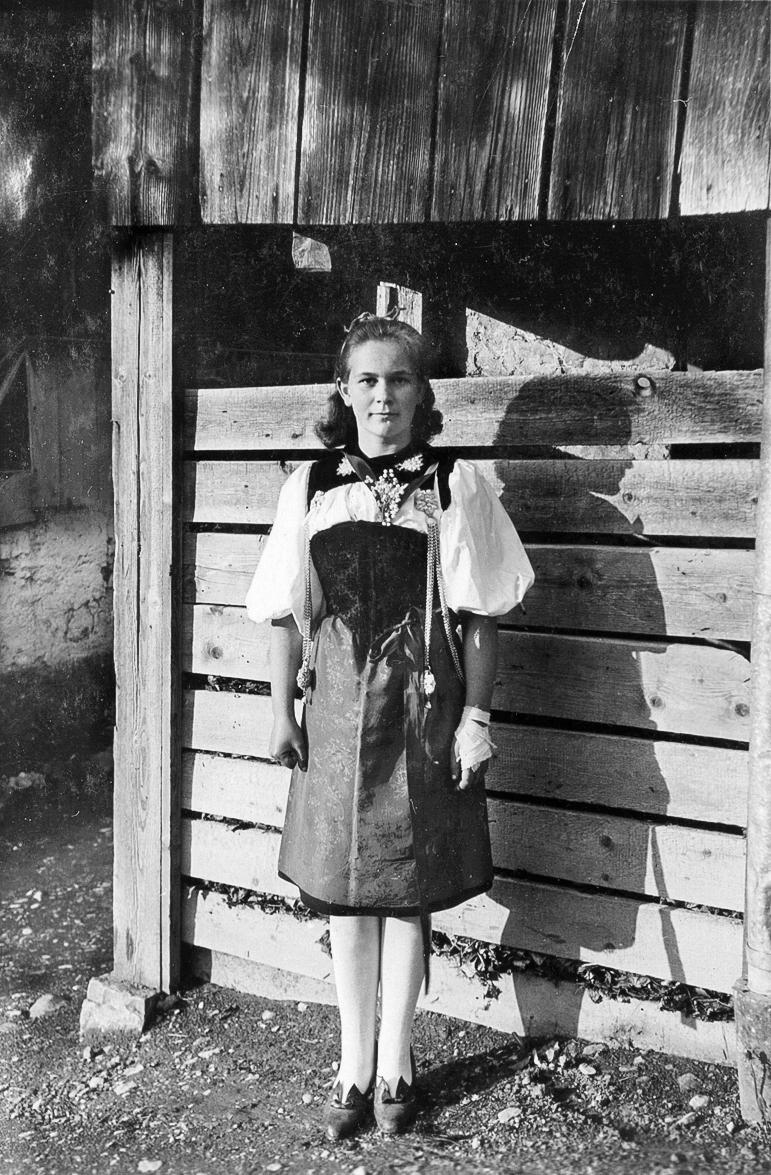
Then Martha smiles. “Don’t ask me what I had for dinner yesterday, but I still remember so much from the past.” Her eyes flash mischievously. “For example, when I was six, I pretended to leave home. Mother said, ‘I don’t want you anymore. Child, if you can’t behave, then leave.’ I promptly walked out in my messy apron to the train station and got on the next train. I told the conductor I had to go to my aunt in Müntschemier.
In Bern, I knew that I had to descend the platform stairs where a woman in a blue frock would be standing, a ‘Friend of Young Ladies.’ She would bring me to the train. I didn’t need a ticket yet, and when we reached the station, the conductor brought me to one of these ladies who, sure enough, waited with me for the connecting train to Müntschemier.
“This was still possible in those days. No one suspected anything since I was so self-assured and knew the way from trips with my mother. But my aunt was shocked when I appeared on her doorstep. ‘Where is your mama?’ ‘She didn’t want me anymore. Perhaps you still want me, auntie?’ I wanted to give my mother a scare. But the tables were turned! She sent a basket with my clothes, and didn’t come for me for three weeks.”
Back then there was no kindergarten in Leissigen for the precocious girl. “However at the age of seven, I was finally able to enter the first grade with Miss Frutiger. I still talk with her regularly on the phone. In the meantime, she is 92 years old. Back then she was such a young teacher; that was wonderful. For me, learning was always easy.”
Martha’s childhood was affected by the war. “It was a big upheaval. We always had soldiers quartered in our house throughout those years. We planted fruit and vegetables at three different locations in the village. Vegetables and potatoes were growing in every flowerbed. There was very little fat in our house because of rationing. Everything was boiled. No more buttered hash browns, and only one quart of milk instead of four. There was a quarter pound of butter per person per month: one pound of sugar, one pound of flour and a quarter pound of coffee or tea. I remember it very well. We preserved or dehydrated what we could. Instead of chocolate, we ate slices of dried apples and pears. There was no fresh bread for sale, and we never saw rice for the entire war. Despite that, there was always singing in our house and we never went hungry.”
“Mädi,” as they called the youngest one in the Zumstein house, learned how to play the card game Jass from soldiers. That would earn her a scolding from the teacher that she would never forget. “Was that unfair! One morning the teacher in the ninth grade approached me menacingly with his signet ring shining on his hand and said, ‘Martha you were playing Jass until midnight. I know that for a fact.’ ‘No, teacher, I did not. Every fool knows that soldiers have to turn in by 9:30.’ There was a big to-do at home. I was supposed to apologise to the teacher for my smart remarks. But I couldn’t. I hadn’t said anything wrong.”
Martha taught herself to play the accordion. “I retreated to the topmost floor of the house where no one would hear me. I searched for the notes and sang and yodeled along. Here this accompaniment is called ‘cording.’ It wasn’t long before I was able to recognize the different keys. And then one summer day, when I had opened the attic window, I heard a neighbor say to her husband, ‘Turn on the radio. They are broadcasting folk music.’ I must have played pretty well.”
Falling in love
After graduation at age fifteen and a half, Martha moved in as a maid with a family in the French part of Switzerland. “Under the auspices of the ‘Friends of Young Ladies,’ first in Peseux and then in La Chaux-de-Fonds, where besides doing housework, I learned to eat escargots, snails.” Rather than a maid, Martha wanted to become a home economics teacher. “But my father felt that it would be unfair to my siblings to underwrite such an advanced education. Fritz became a mechanical technician, Elsbeth a seamstress. They only required three years of training. I would have had to attend school for four years in Bern.” So at sixteen, Martha was only able to attend secretarial training in Interlaken. “Twice daily, I rode the train from Leissigen to Interlaken and back. That these train rides were to determine my future was the farthest thing from my mind.” An angry argument about an open window in third class on the Bern-Lötschberg-Simplon (BLS) train was to be the start of her love story.
“The young BLS conductor reprimanded me for opening the window to the frosty winter air for a better view of Lake Thun and to let some fresh air into the stuffy compartment. ‘What are you thinking? You should be ashamed of yourself! We have the heat on!’ And he slammed the window shut. I found that rather rude, and only back at work in the office with time to think about it, did I realize that he had been right. Sheepishly, I apologized to him the next day on the train. After that, we always greeted one another especially cordially. I liked him, and we occasionally had a short chat, but we remained proper and formal, Mr. Werner Bernet and I. Bit by bit, I learned more about his life. Out of a clan of 17 children, his father with wife and children migrated from Grindelwald to Wisconsin, USA, where the father, Christian, worked in a cheese factory. The children, Werner and Trudi, attended school there until their father became ill in 1939.
On the recommendation of his doctor to take a year off to recuperate, they decided to visit Switzerland. Werner intended to return with the family to America in the fall of 1939 where he had a four-year scholarship to study forestry. The mobilization for war on September 1 preempted his plans. As a Swiss citizen, he was required to enter basic military training. After completing his service, still during the war years, he learned French in the French part of Switzerland. Then out of 300 applicants, he was given one of six desirable positions as a conductor on the BLS Railroad.
“One day, at age eighteen, during my second year of secretary schooling, shortly before Interlaken, Werner asked me, ‘what are you doing Sunday?’ He invited me up to the Kleine Scheidegg. It would be nice, I thought, but I would have to ask my mom if she would pay for the ticket. The hike through the Bonera was unforgettable and romantic. Under the Eiger [mountain], we agreed to address each other informally. ‘When people know each other so well, they don’t call each other Mr. and Miss anymore. I’m Werner and you are Marti.’ Then he kissed me. Yes, under the Eiger. When I look at the webcam picture, I think, yes, under the Eiger.”
In 1946 the Bernet family wanted to return to the USA. “I was finished with my training. Werner and I we were still an item, as they said back then. But it was clear from the beginning for him that he wanted to return to the US. ‘If you don’t want to come with me, then we should end it now.’ I assured him that I wanted to come along.”
“Suddenly, word came that if we married within six weeks, I would be allowed to go along. Otherwise, I would have had to wait for another two and a half years for a visa. I was overwhelmed being just 19. One had to be twenty in those days to sign one’s own marriage certificate. Our parents conferred about the whole situation. Finally dad said, ‘If he were the same age as you, I wouldn’t sign. But, he is ten years older than you and no longer a young lightweight,” she recalls.
“Werner knew nothing about any of this, and I wanted to surprise him in Spiez where he had an hour layover between trains. ‘Werner, we have to get married right away.’ He looked at me wide eyed. ‘But not to me… .’ And I laughed at him, and said, ‘Not that… we have to get married so that I can come to America with you!’“
In haste, they were married in November of 1946. “I had no time to put together a dowry. In any event, it was said we couldn’t have taken it with us.” Then everything came to a halt. “Every time we would have been able to go, Americans were given preference. It turned to winter and then to spring, and Werner’s parents took over management of the Niesenbahn Restaurant for the summer season. I did not look for a job, but waitressed in my in-law’s business. Our visas would have expired on October 2, 1947.”
Moving to Wisconsin
Werner had had enough. At the beginning of September he decided to appeal to his godfather, his father’s cousin, Federal Councilor Nobs, a member of the Swiss government. Then at once everything went very quickly. “On Wednesday he called, and by Thursday morning at 10 a.m., we were both in the Bundeshaus [Federal parliament building]. At 2 p.m., we had the transit papers.” By the following Sunday, everything had to be packed and ready to travel. Fortunately, the restaurant lease had already been terminated. “But a mere four days was a bit abrupt. Dad said to me, ‘and the accordion, don’t you want to take it along? One never knows.’ When I think of how much joy it has given me in America! I packed my clothes and a few souvenirs: a little book with birthday greetings from my classmates and my drinking cup. But the accordion and my husband were the most precious things I took along.”
On that Sunday along with 16 large trunks, the six members of the Bernet family – parents-in-law, Martha and Werner, and his recently divorced sister with her young child – emigrated once again to America, first by train to Genoa, and then aboard the SS Marine Shark over the ocean towards New York.
The departure from home was difficult. “The morning of our departure, we attended church in Leissigen and visited the cemetery. My oldest brother had died in May 1946 of kidney disease. I can still hear my mother at the grave lament in a thin voice, ‘Here in the grave lies my oldest… and today my youngest is going to America.’ That was very hard for me. I reproached myself for abandoning my mother.
“Father was less demonstrative, but as I was already standing on the train platform, I heard him shout, ‘you’ll keep on singing, won’t you. Then everything will be alright.’ And that proved to be so. As I looked out the train window, I saw how mother collapsed in my father’s arms. One can never forget a scene like that.”
American life
On the Atlantic, Martha was violently seasick. Thankfully, she remembers little of the six days on the open ocean. “When we arrived in New York, I was fortunate that I didn’t have to be vaccinated. My doctor had forbidden it, because I had had my appendix removed just three weeks before our departure.” Werner and Martha intended to move to Colorado into the mountains. But the mother-in-law was drawn back to Wisconsin, and Werner did not want to leave his parents by themselves. In Juda, Wisconsin, he took a job in a cheese factory. He wanted to make Swiss cheese again, Emmentaler.
“And me, the spoiled secretarial student, had to scrub, cook and do laundry, and work like a slave. In March, a year and a half after our wedding, our first son, Hans, was born. Life was difficult, no fun at all. I had to bite my tongue often. I couldn’t speak English. We were out in the country. The summers were unbearably hot and humid. We had no air conditioning. We struggled. I weighed just 89 pounds. Werner said, ‘If you go down to 85 pounds, we’re returning to Switzerland.’ But I wouldn’t get that through my thick skull. I could already hear people gossiping, ‘they wanted to go to America, and now they’ve had to come back.’“
“I said to myself, ‘it will get better’.” By fall, her appetite had returned and she slowly improved. “It built character. I learned a lot. If you have the will, you can persevere. I simply tried to pull myself together. But I was homesick, and cried when no one could see me. There was no way that I wanted Werner to know how much I was suffering. And outside there were the cornfields as far as the eye could see, cornfields only. I imagined that beyond them on the horizon were mountains. But there were none. I cried and cried.”
The little family moved to Jordan Valley. “There we had a house to ourselves. I no longer had to work so hard, so I could spend time with the little one and soon with my second baby, daughter Käthi.” But Werner was looking for something of his own. “He bought a cheese factory in Dutch Hollow. Again there was much heavy work. But this time we were working for our own benefit. I enjoyed making cheese. When the children were still small, we would place them in a large cheese kettle padded with a blanket. They played in there. Today they would say, ‘That’s child abuse; you can’t do that.’ But things were good.”
The Bernets produced Emmentaler for a large company in New York. “Four wheels a day, about 200 pounds apiece. Learning by doing, I became a cheese maker’s assistant. Getting up at 4 a.m. became my routine. I washed 84 centrifuge plates every day. One day, I asked myself how other maker’s assistants quenched their thirst. They drink a beer. So that is what I did down in the cellar.
I became so tired that I fell asleep right on top of the cheese press. ‘Want a beer?’ Werner would tease me for years to come.”
Son Peter arrived in 1956. “I worked until the day he was born. At ten past five p.m. I arrived at the hospital, and at six o’clock the 10 pound boy had already arrived.”
At the end of 1956 Martha traveled with Peter back to her former home for the first time in nine years. “And I flew for the first time in my life. It was a terribly long, 22-hour flight. From Chicago Midway four hours to New York, and after a long wait for the Swissair plane, we finally took off. Because of a snowstorm we had to make an unscheduled landing at an American airbase way up in Greenland in minus 40 degree outside temperatures.”
The weeks at home were wonderful for Martha. “My parents always said that it had become so quiet after my departure, that no one made them laugh anymore. I travelled very little and stayed mostly in Leissigen with my son. The high door thresholds were great fun for him. There was nothing like that in America. And I savored the time with my parents. If anyone wanted to see me, then they should come to me, I thought.”
Upon his little family’s return, Werner picked them up at the new O’Hare Airport in Chicago. Far and wide there was no hint of a huge terminal building. “There was just a little shed where Werner drank a cup of coffee until he could walk directly out onto the tarmac to hug us as we descended the stairs from the plane.”
A slice of Switzerland
The economic situation for small cheese factories in the early 1950s became more and more difficult. Large tanker trucks were enlisted to haul milk to larger processing centers. “We sold the factory, and Werner worked for a time on his cousin’s mink farm until a small specialty store in Monroe was offered to us. We jumped at the chance, and soon ‘Bernet’s Cheese and Sausage Shop’ was open seven days a week. I became a member of the church choir and finally had the opportunity to sing again.” In 1952 Martha was one of the founders of the Swiss Club of Monroe with over 400 members.
“The club doesn’t exist anymore. Everyone has passed away. In the 50s and 60s, many West Europeans including Swiss came to the area. Now, we are just about the last ones remaining.”
In good times the Bernets imported 10,000 cowbells a year for their store, Tobler chocolates, and Knorr soups. “I was the first one to bring Aromat to Monroe. The sample shipment of 24 tins was a runaway success. Now, Aromat is found all over the USA.” They offered brätzeli irons, scythes, and music boxes, but cheese and sausages were their specialties. Martha loved the business. “Our little shop was located behind a bar and grill. In 1957, we paid $25 a month rent – including heat and water. We had the opportunity to move up to the main shopping square in Monroe, but we did well where we were.” Then came another boy, Ruedi, in 1959. And businesswoman Martha traveled regularly to Switzerland in search of items for the shop.
In 1973, they won a trip to Switzerland: “From the Tobler Chocolate Company. Not for our large sales volume, but because we had a particularly attractive chocolate display in the shop. We had ourselves photographed in front of the display.” Werner in his Swiss cow herder’s jacket and cap, Martha in her Bernese Sunday costume. For the first time, the two vacationed together, and closed the store for a whole week. “That was something, our 40-strong travel group.
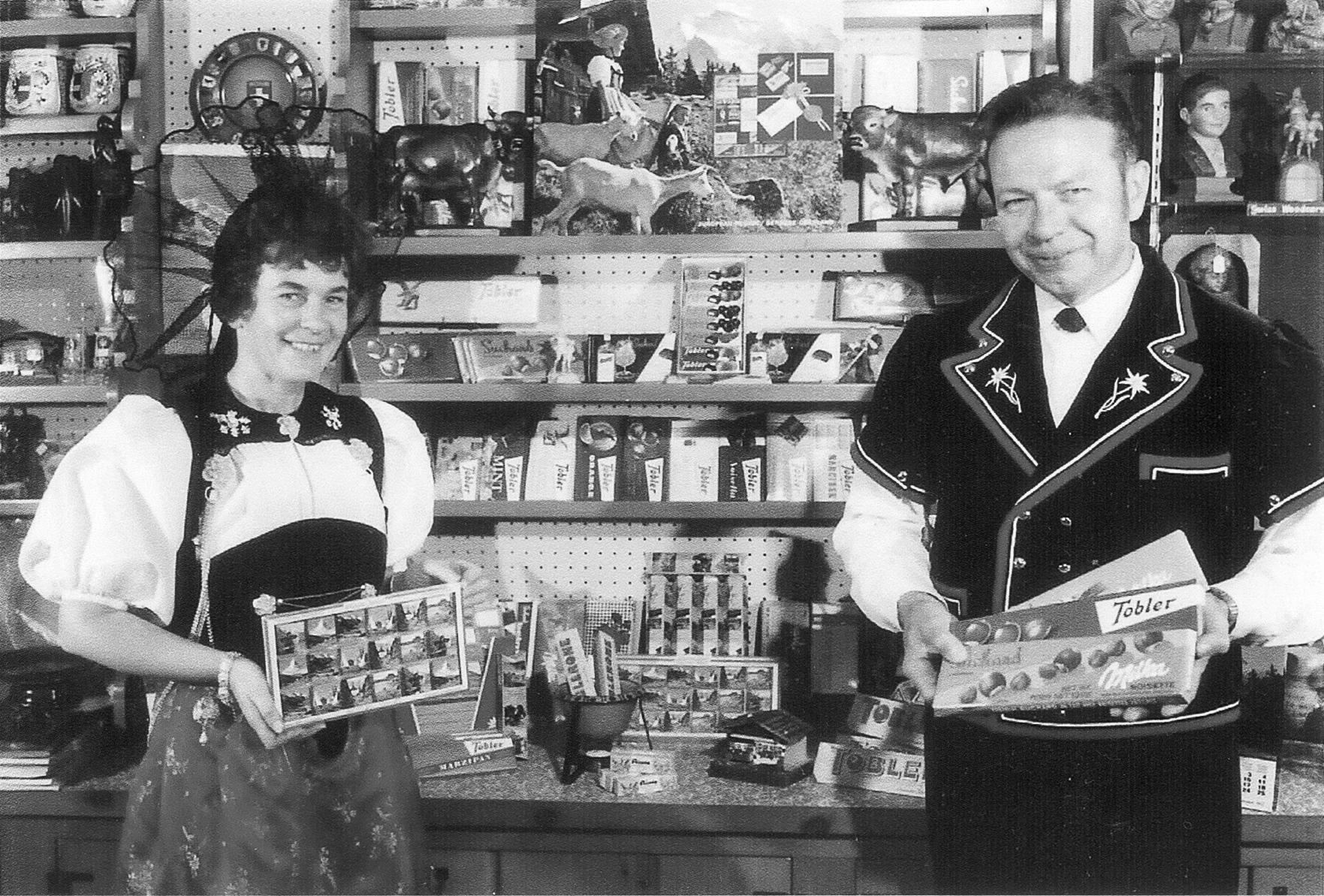
In Bern, we were put up at the Bellevue Palace Hotel in a room with silk comforters and crystal chandeliers hanging from the ceiling. But the beds were so soft that I decided to sleep on the floor. When I awoke at 5 a.m., Werner was not in the bed – he was on the floor too. We had a wonderful time. In the evenings I wore floor-length evening dresses. Werner held the chair for me like a gentleman. ‘Just don’t expect me to do this at home…’ he grinned with a wink. I was just happy that he knew how to do it at all.”
Love and loss
At the close of the 1970s, a singing quartet asked her to join them. “That’s how I became a member of the Edelweiss Stars of New Glarus. In the 80s and 90s, we appeared throughout the region; we were well known. We appeared at First of August festivals and on holidays to sing and yodel. Having a woman who helped to cover for me in the store… life was good.”
In 1983, the Bernets sold their business. “Werner was 65. The entire following year we traveled: to Switzerland and to visit my daughter, who in the meantime was living in Canada. In 1984 after a memorable August 1 celebration, my husband simply didn’t wake up. That was a shock. He lay dead in bed. He was hardly ever ill. He had had a heart attack. He simply stopped breathing. He left me without saying adieu. That was hard. Only later did I remember how at the first of August festivities, he had sat on the stair watching me play accordion… as if he were saying goodbye. My sister, who was visiting at the time, said on the way home that night, ‘Werner is still in love with you like he was back then.’ That is how he said goodbye.
“It was hard, very hard. Our anniversary came, no Werner; his birthday, no Werner. Christmas – Werner missing again. I simply couldn’t believe it. It was five years before I was again able to say that I enjoyed life. But I can never forget him. Even 25 years later, I still sit at the kitchen table and look at the empty chair, and I long for him. Thankfully, I already had my radio program.
“No, I could never have married again. Naturally, there were days when I could have sent him to the moon, without a return ticket. You know, that happens in any marriage. But I miss him so.”
Life went on for Martha. In 1985, she spent a month in Switzerland with the Edelweiss Stars at the National Yodel Festival and many other appearances.
“Maintaining Swiss culture here in Wisconsin is difficult. I am eighty. I won’t be here much longer. Trudy Thomman is 84; Margrit Affolter is 85. They came to America the same time I did. I could speak Swiss German in every store on the shopping square. But the traces of Switzerland are slowly disappearing. You see that in the telephone directory. It used to be that 80 percent of the names were Swiss. Now they’re gone. When you visit Monroe now, the Swissness is mostly a facade.
On the other hand, I feel that I am also an American. I have friends and was in the church choir for 44 years. Our church is only active because we members contribute to it. We employ two ministers and have a budget of $400,000 a year. I belong to the altar committee and to the group that prepares communion. At home in Leissigen in one of the oldest chapels in Switzerland perhaps 20 attend church on a Sunday. Here we have three services every Sunday. Eight hundred people attend. Why? It certainly isn’t that we are closer to God here. But churchgoing is a social event. Between services there is coffee and cake, cookies and cheese. We exchange the latest news with one another.”
Martha’s thoughts turn to her children, visibly with pride. “Hans will soon be 60. He studied to become a teacher, but today he is a manager for the cataloguer, The Swiss Colony. Via catalog and online, they sell cheese and Swiss specialties throughout the USA. Kathy is 58, married to a Canadian hockey player; she had lived for several years in the Northwest Territories way up in the arctic. Peter lives in Washington and is an analyst. And Ruedi is a physical education teacher here in Monroe.
“I have a joyful disposition, even if now and again it is hard. I always sang and laughed. People often ask, ‘Martha, do you have any new jokes?’ Werner was more of a pessimist. I always told him that he should have a hobby. His answer was, ‘I have one, you!’ He supported me with the radio business and the performing. He told me, ‘it wouldn’t have been possible without you.’ It is true; we always pulled together. I have had an interesting life and still have many dear people around me. Once a week, I play Jass with three others. We are two men and two women. And of course, the men assume they are the better players.”

In compliance with the JTI standards
More: SWI swissinfo.ch certified by the Journalism Trust Initiative







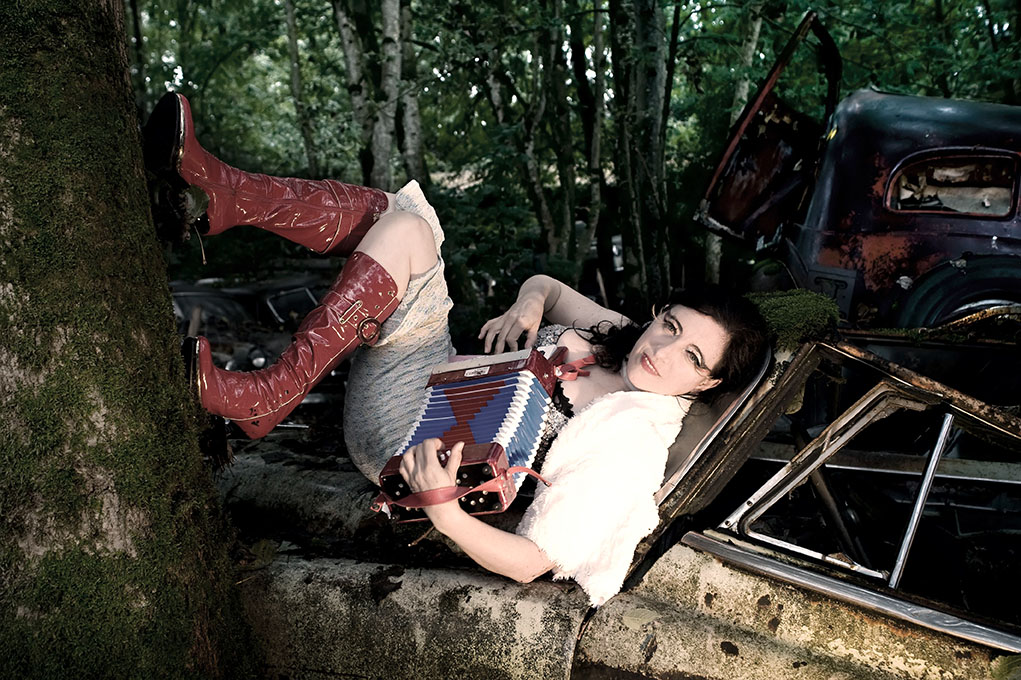
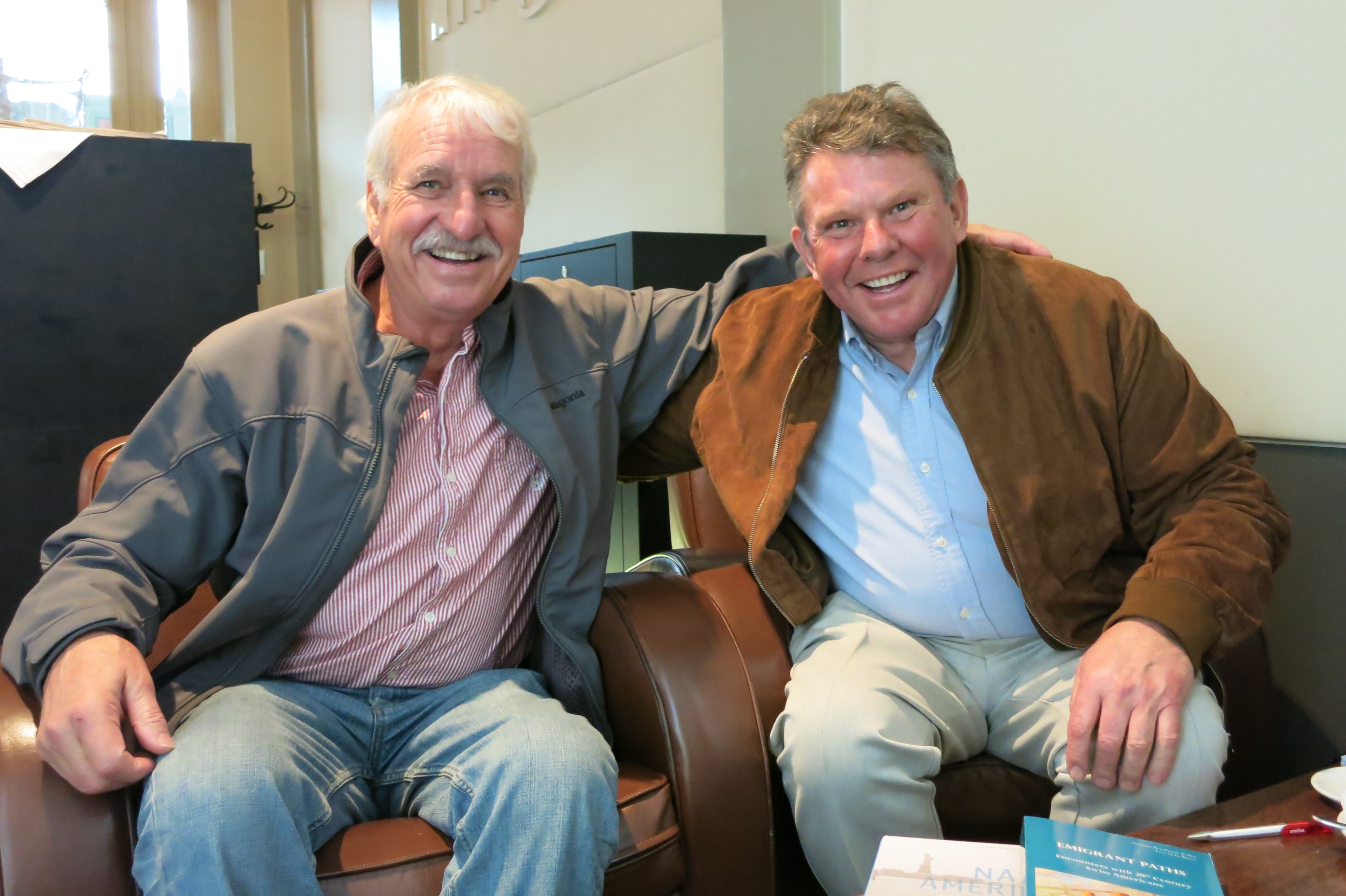
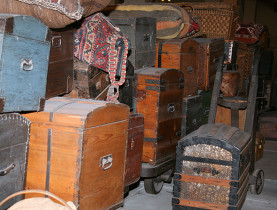

You can find an overview of ongoing debates with our journalists here . Please join us!
If you want to start a conversation about a topic raised in this article or want to report factual errors, email us at english@swissinfo.ch.